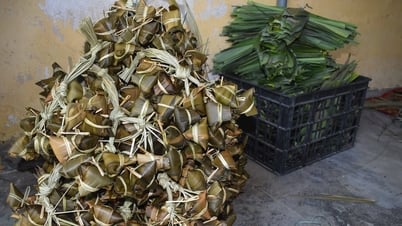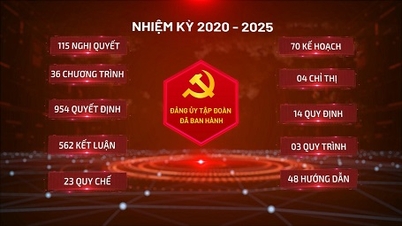The Governor said that in the coming time, the State Bank will continue to intervene in the gold market (if necessary) with appropriate volume and frequency to stabilize the market and monetary policy goals.
State Bank Governor Nguyen Thi Hong said she will consider intervening in the market when necessary.
Governor of the State Bank Nguyen Thi Hong has just sent a report to National Assembly deputies regarding a number of issues serving the question and answer session at the 8th Session of the 15th National Assembly.
The Governor emphasized that the State Bank will conduct a full review of the implementation of Decree 24, propose amendments and supplements in accordance with the practical situation, contributing to preventing the goldification of the economy , not allowing gold price fluctuations to affect exchange rates, inflation and macroeconomic stability.
Gold market manipulation not ruled out
According to the Governor of the State Bank, the main reason for the sharp increase in international gold prices recently is due to escalating geopolitical tensions, trade, and armed conflicts in many countries around the world.
Domestic gold prices fluctuated strongly in line with world gold prices. From the beginning of the year to June, the gap between domestic and world gold prices widened, especially for SJC gold bars.
The difference in price of SJC gold bars compared to world gold prices at times reached 18 million VND/tael (May).
On the morning of November 5, SJC gold bars were traded at VND87-89 million/tael, an increase of VND13.5 million/tael (about 18%) compared to the beginning of the year.
"The fluctuation of domestic gold prices basically depends on the development of world gold prices and the supply-demand relationship in the market," the Governor said.
On the demand side, the world gold price has continuously increased, along with the difficulties of other investment channels (frozen real estate, gloomy corporate bond market, low bank deposit interest rates...) making gold more attractive.
However, the State Bank leader said that through monitoring by units in the system, the demand for gold purchase is mainly concentrated in Hanoi and Ho Chi Minh City and has psychological and expectation factors.
In addition, the State Bank also believes that it cannot rule out the possibility of market manipulation and violations of relevant laws on tax and competition, which have led to a high difference between domestic gold prices (especially SJC gold) and world prices.
From 2014 to 2023, the State Bank did not increase the supply of SJC gold bars to the market. However, since April, the State Bank has intervened in the gold market through bidding and direct sales of gold bars to supplement the supply of SJC gold bars to the market, limiting the impact on the macro economy, currency, and foreign exchange.
Specifically, from April 19 to May 23, the State Bank organized 9 auctions with a total winning volume of 48,500 taels (equivalent to about 1.82 tons). However, after 9 auction interventions, the difference between SJC gold price and world price remained high.
To quickly control and reduce the difference between domestic gold prices and world prices, the State Bank switched to the method of selling gold bars with appropriate volumes. The State Bank selected 4 state-owned commercial banks: Vietcombank, VietinBank, BIDV, Agribank and SJC Company.
The report shows that from June 3 to October 29, the State Bank organized 44 direct sales of SJC gold bars, supplying the market with 305,600 taels of SJC gold (equivalent to about 11.46 tons of gold).
Before the State Bank announced its policy of selling SJC gold bars directly, SJC gold bars on the domestic market were bought and sold at 89-92 million VND/tael, a difference of more than 18 million VND/tael (about 25%) compared to the world price.
According to the State Bank, since the official announcement of the direct sale of gold bars, the difference between the domestic gold bar selling price and the world price has decreased, currently only about 3-5 million VND/tael different from the world gold price (about 5-7%).
Will consider intervening in the gold market when necessary
According to the Governor, there are currently two shortcomings and limitations in the management of the gold market. One of the two shortcomings is that some gold jewelry products with a content of 99.99% are used as gold bars, not excluding the raw materials for production from smuggled gold. This phenomenon is easily exploited to reduce the effectiveness of the strict management of the gold bar market under Decree 24/2012/ND-CP.
Previously, implementing Decree 24, for the gold bar market, the State Bank fundamentally rearranged, reducing the number of credit institutions and enterprises licensed to buy and sell gold bars to 16 enterprises and 22 credit institutions.
For the gold jewelry and fine art market, the number of enterprises granted by the State Bank with a Certificate of Eligibility for the production of gold jewelry and fine art is 6,681 enterprises. The business of buying and selling gold jewelry and fine art is a conditional business activity that does not require a certificate of eligibility for business. Enterprises that meet the conditions for buying and selling gold jewelry and fine art only need to register their business with the Department of Planning and Investment, and do not need to apply for permission from the State Bank.
According to the Governor, from 2012 to now, the State Bank has not granted licenses to import raw gold for enterprises producing gold jewelry and fine art. Enterprises must balance their own raw gold sources to produce gold jewelry and fine art.
In addition to the phenomenon of gold jewelry “evading” the regulations on gold bars, another problem of the gold market, according to the State Bank’s assessment, is that there is still a gap between domestic and international gold prices. The market is still not really stable and sustainable, still affected by psychological factors, expectations, and potential risks affecting the currency and foreign exchange markets; it does not encourage people to sell gold and convert it into VND to invest in production and business.
Regarding future management orientation, the State Bank said it will continue to intervene in the gold market (if necessary) with appropriate volume and frequency to stabilize the market and monetary policy goals.
The State Bank will also coordinate with relevant ministries and branches to carry out inspections and examinations of the activities of gold trading enterprises, stores, agents distributing and trading gold bars and other entities participating in the market. Timely detect loopholes and shortcomings to proactively, actively and effectively handle them according to their authority and report to competent authorities for appropriate and prescribed handling measures for issues beyond their authority.
The State Bank will conduct a full review of the implementation of Decree 24/2012/ND-CP, propose amendments and supplements in accordance with the practical situation, contributing to preventing the goldification of the economy, not allowing gold price fluctuations to affect exchange rates, inflation and macroeconomic stability; enhancing the State's role in managing and regulating the gold market in accordance with regulations, ensuring economic security, financial security, national currency and social order and safety./.
According to VNA
Source: https://baobinhduong.vn/thong-doc-khong-de-bien-dong-gia-vang-anh-huong-den-ty-gia-lam-phat-a335067.html



![[Photo] Prime Minister Pham Minh Chinh attends the event "Digital transformation of the banking industry by 2025"](https://vphoto.vietnam.vn/thumb/1200x675/vietnam/resource/IMAGE/2025/5/29/0e34cc7261d74e26b7f87cadff763eae)




![[Photo] Prime Minister Pham Minh Chinh receives leaders of Excelerate Energy Group](https://vphoto.vietnam.vn/thumb/1200x675/vietnam/resource/IMAGE/2025/5/29/c1fbe073230443d0a5aae0bc264d07fe)




















































































Comment (0)